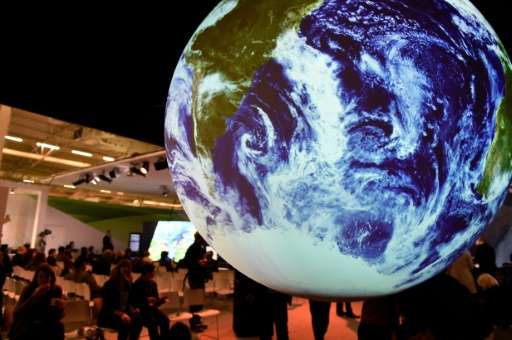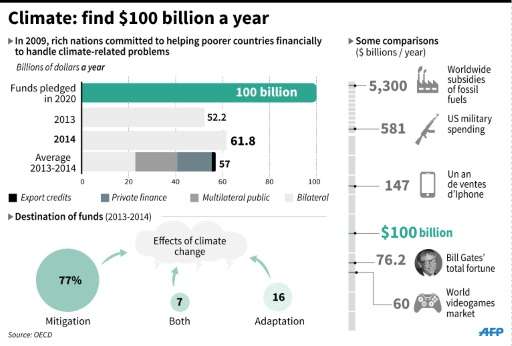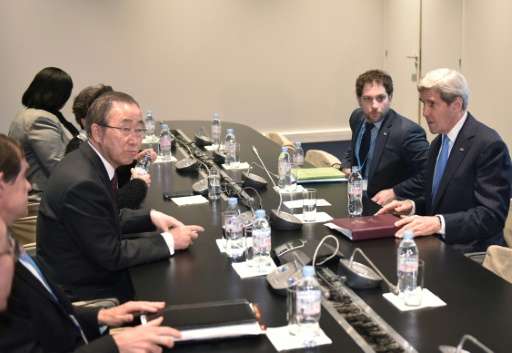Ministers tackle flashpoints on climate deal

Ministers tasked with securing a historic climate-saving pact in Paris sought Tuesday to settle the most volatile flashpoints, such as mustering hundreds of billions of dollars to help the developing world.
The 195-nation UN talks have been billed as the last chance to avert the worst consequences of global warming: deadly drought, floods and storms, and rising seas that will engulf islands and densely populated coastlines.
To reach an elusive deal by a Friday deadline, however, the ministers must first resolve a handful of decades-old disputes that have blocked the path to the first truly universal climate pact.
Nations remain divided over how to give finance for developing nations to cope with global warming; how far to limit planetary overheating; how to share the burden between rich and poor nations; and how to review progress in slashing greenhouse gases.
"They are finally doing the dirty work of negotiating, which is very hard," said Jennifer Morgan, global climate analyst at the Washington-based World Resources Institute, who is an observer at the talks.
"You are finally starting to see the really hard bargaining and arguing that has to happen. It is a good thing, because otherwise they would still be standing their positions."
A new spirit
Observers said a new confidence was emerging in Paris, a hopeful sign six years after the spectacular failure of the last attempt to reach a global deal, which collapsed in Copenhagen, fractured by distrust between rich and poor countries.
"Those of us who have been watching these for a long time think there has been a spirit of cooperation," Greenpeace political advisor Ruth Davis told journalists.

"But cooperation has to manifest itself in something real and meaningful," said Davis, who described the complex negotiations as being akin to a 12-dimensional Rubik's Cube.
Taking effect in 2020, the Paris accord would seek to limit emissions of heat-trapping greenhouse gases driven by coal, oil and gas—the backbone of the world's energy supply today.
The goal is to limit global warming to under two degrees Celsius (3.6 degrees Fahrenheit) from pre-Industrial Revolution levels.
Negotiations are making headway on every front, said France's top negotiator, Laurence Tubiana. "We are advancing on everything," she said. "There is no issue where we are blocked. None."
One potential deal-buster is money.
Rich countries promised in 2009 to muster $100 billion (92 billion euros) a year from 2020 to help developing nations make the costly shift to clean energy, and to cope with the impacts of global warming.
But how the pledged funds will be raised remains unclear—and developing countries are pushing for a promise that the amount will be ramped up beyond 2020.

Meanwhile, rich nations are insisting that developing giants work harder to tackle their greenhouse gases, noting that much of the world's future emissions growth will come from their fast-growing economies.
Small island states at risk of being swamped in a warmer world are also part of a big coalition of vulnerable nations pressing for a more ambitious accord of limiting planetary warming to less than 1.5C.
Ministers including US Secretary of State John Kerry are battling to formulate broad conclusions on those toughest issues by Tuesday evening, Tubiana said, after which they will examine the entire package.
French Foreign Minister Laurent Fabius, presiding over the talks, has charged the world's ministers to deliver a draft accord by Wednesday, setting out clear options on the divisive issues.
Warning of the price of inaction, Kerry said the United States spent $126 billion last year undoing the damage of eight huge storms.
In the Philippines, Kerry said he had seen the splintered wood strewn across the mountains in the path of Typhoon Haiyan that struck in November 2013.
"That's the future, folks, unless we tame this monster that we have unleashed," he said.
© 2015 AFP



















